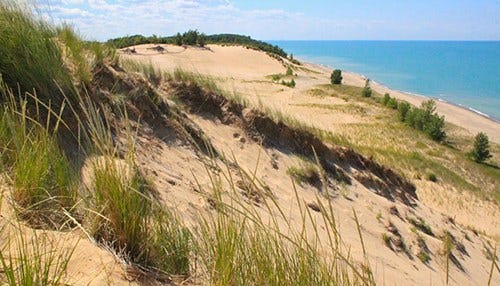Indiana Dunes National Park Bill Finds Opposition
 (photo courtesy Indiana Dunes National Lakeshore)
(photo courtesy Indiana Dunes National Lakeshore)
Subscriber Benefit
As a subscriber you can listen to articles at work, in the car, or while you work out. Subscribe NowA bipartisan effort to designate the Indiana Dunes National Lakeshore as a national park is receiving opposition from the Trump administration. In written testimony released Wednesday, Deputy Director Daniel Smith says the redesignation "would be inconsistent with the National Park Services’ naming conventions for different types of park units."
Two bills are currently being considered by Congress to make the change. House Resolution 1488 has already received unanimous approval from the U.S. House of Representatives. A companion bill, Senate Bill 599, co-sponsored by Senators Joe Donnelly (D-IN) and Todd Young (R-IN) is currently in the Committee on Energy and Natural Resources Subcommittee on National Parks.
Smith says the current designation for the Indiana Dunes is appropriate and in line with the National Park Services’ efforts to provide consistency in the naming of park units.
"Our preference is that the designation of ‘national park’ be reserved for units that contain a variety of resources and encompass large land or water areas to help provide adequate protection of the resources, and that in general, similar types of units have consistent designations," Smith said. "Indiana Dunes has more in common with the other Great Lakes national lakeshores—Apostle Islands, Pictured Rocks, and Sleeping Bear Dunes— and with the National Park System’s many other national seashores and national recreation areas, than with most national parks. Indiana Dunes is the smallest of the four lakeshore units, and the only one of the four that does not include any designated wilderness."
Smith says the department does support, however, another provision of H.R. 1488, which redesignates the Miller-Woods Trail inside the Indiana Dunes National Lakeshore as the "Paul H. Douglas Trail."
Our partners at The Times of Northwest Indiana report Donnelly remains hopeful the legislation will be approved by the Senate despite the opposition from the administration. Young spokesperson Jay Kenworthy tells the publication the senator was disappointed by the testimony.
"He has reached out for more clarity on the position and will work with the administration to address any concerns they may have," Kenworthy said.
You can read the full written testimony from Smith below:
